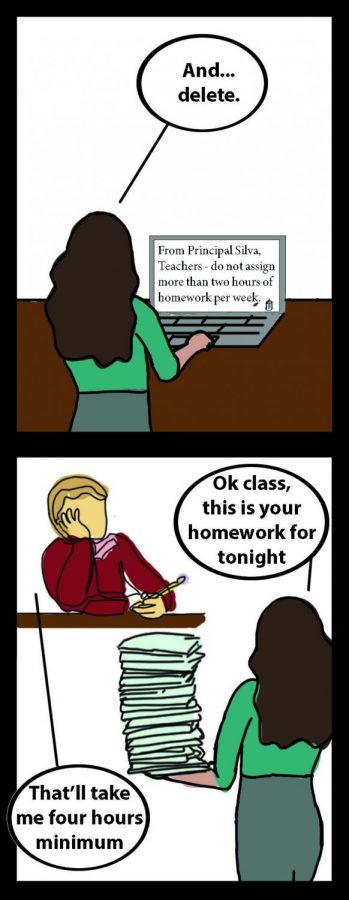Teachers, your workload is drowning us
Despite frequent communication from Principal Ryan Silva, many teachers have continued to assign intense amounts of homework. With all classes combined, this can often add up to several hours of homework a night.
October 29, 2021
Did you know your teachers are only supposed to assign you two hours of homework per week, total, according to Creek policy?
That may surprise you, because if you’re anything like the members of our staff, some of your teachers assign you two hours of work per day. For many kids, at Creek and elsewhere, a large volume of schoolwork can damage mental health and erase free time. But where do we draw the line of “too much”?
The issue with designating a time limit on homework is that it’s difficult to generalize the time spent on any given assignment. It’s also difficult to put the same limit on the workload of a CP class and an AP class. But from the conversations we had within our staff and with our peers, we came to a clear consensus: teachers are assigning too much homework, and they’re not giving us enough time to do it.
Students this year are coming off of a school year where expectations were both higher and lower than they had ever been. Last year, stress was off the charts. It was astronomically difficult for many of us to balance and focus on our work with so little structure. Students often felt like the workload was too high. Even in the last seven weeks of school, when CCSD returned to full in-person, we weren’t back to a real normal. It was different, and it was overwhelming.
And yet, both students and staff feel that kids last year simply didn’t learn enough. This year’s students lack key skills or background knowledge they should have gained last year but didn’t. And so, even as kids are still readjusting to being back to “normal” school, it feels like teachers are racing to keep up.
It seems ludicrous to expect that students are ready to get back to the full workload. Not a single one of us has recovered from the unprecedented stress and change of the past year and a half, and not a single one of us should be expected to be.
Even as teachers are receiving frequent communication from Principal Ryan Silva to lay off the work a little bit, it feels like many of them are disregarding this entirely. One student in our staff described it as a “my class is most important” mentality. While it’s impossible to know if that’s true, it is the case that many teachers don’t seem to be paying much mind to how an intense level of work can hurt students. And if they are paying mind to this, then, well, they need to do better at following through on it.
There is another level to the problem. Last year, there were few restrictions on turning in late assignments. Most students became accustomed to a little more leniency, often waiting until the end of the semester to turn late assignments in. Because so many teachers went directly back to a strict policy, where turning in something a day or two late is a 20 or 30% hit to your grade (or more), many students are floundering to remember their work routine from 19 months ago, the last time students were expected to work on a normal schedule.
One way to prevent this is with something similar to what some math teachers do – as long as your work is turned in by the unit test, or even the mid-unit quiz, it earns full credit. This way, students will still complete work in time to get practice for assessments, and can still adhere to original due dates, but will also have the ability and freedom to push something back a couple days if they find themselves swamped with other work, sports, family, or their jobs.
All of this is not to say that homework is unnecessary or that it should be abolished entirely. But it does need to be reduced – and there is scientific evidence to back this.
A 2013 study by Mollie Galloway, Jerusha Conner, and Denise Pope found that students in high-achieving high schools in predominantly upper-middle class areas – just like Creek – thrived best with no more than a couple hours of homework each night. In fact, the researchers found that students who did more work than that suffered damage to their physical and mental health.
In an Oct. 13 email to staff, Silva encouraged teachers to incorporate more work time into their schedules using a “What I Need,” or WIN, day every week or so. “When I heard the WIN idea I thought it was wise and allows for student and teacher care,” Silva said in his email. “Sometimes we can get caught up in a sprint mode when the reality is this work is more of a marathon.”
Teachers must adhere to the “two hours a week” guideline as strictly as possible. They should implement policies that allow for more leniencies in the case of late work. But most importantly, they need to listen and understand that their students are still adjusting. We are not ready to go back to preparing for college. Right now, we still need to figure out how to go back to normal.






















